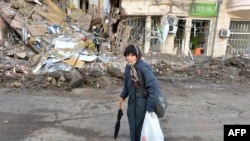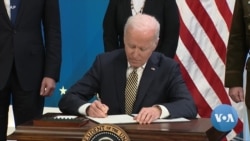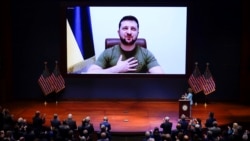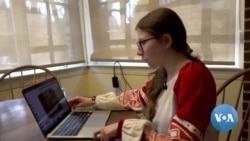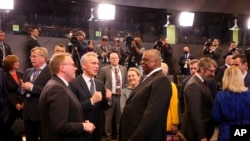U.S. President Joe Biden answered Ukraine’s plea for help on Wednesday with an $800 million assistance package that includes a range of weapons and defensive gear — a response that falls short of the no-fly zone Ukrainian President Volodymyr Zelenskyy seeks as his country faces continued attacks from Russia.
But Biden also raised the temperature in the war of words between himself and Russian President Vladimir Putin.
“I think he is a war criminal,” Biden said, speaking to journalists at an event later in the day. He did not elaborate and walked away.
In response, Kremlin spokesman Dmitry Peskov told the TASS news agency Biden's statement was "unacceptable and unforgivable rhetoric."
“The president's remarks speak for themselves,” White House press secretary Jen Psaki said, when pressed for details. “He was speaking from his heart and speaking from what you've seen on television, which is barbaric actions by a brutal dictator through his invasion of a foreign country.”
Putin launched the invasion of Ukraine three weeks ago. His forces have struck hospitals, schools and homes. Zelenskyy said that about 100 children have been killed in the full-scale attack.
The new U.S. aid package “brings the total of new U.S. security assistance to Ukraine to $1 billion just this week,” Biden said.
“This new package on its own is going to provide unprecedented assistance to Ukraine,” the president added. “It includes 800 anti-aircraft systems to make sure the Ukrainian military can continue to stop the planes and helicopters that have been attacking their people and to defend their Ukrainian airspace.”
In addition to the 800 Stinger anti-aircraft systems that Biden mentioned, the package includes 2,000 Javelin and 1,000 light anti-armor weapons, and 6,000 AT-4 anti-armor systems; hundreds of grenade launchers, shotguns and machine guns; thousands of rifles and pistols; more than 20 million rounds of ammunition and tens of thousands of sets of body armor and helmets.
The Pentagon Wednesday said efforts to deliver the equipment are already underway.
“We understand the tyranny of time here,” a senior U.S. defense official told reporters, speaking on the condition of anonymity to discuss intelligence and other sensitive matters.
“We've already started working on how to source all these all these items and get them there as quickly as possible,” the official said, noting that despite Russian threats, “things are still getting into the hands of the Ukrainians … Those routes are still open.”
The official declined to go into detail about reports that some allies, including Slovakia, are willing to provide Kyiv with the Russian-made S-300 air defense system, capable of shooting down enemy aircraft as well as some ballistic missiles and cruise missiles.
“There are air defense systems, mobile systems that that we know the Ukrainians know how to use and we also know that there are allies and partners who also possess them and might be willing to provide,” the official said. “We’re actively having those discussions.”
The new U.S. assistance package follows an impassioned plea Zelenskyy made Wednesday to U.S. lawmakers, begging them to do more to protect his nation amid a 3-week-old onslaught by Russian forces.
Watch video by VOA's Katherine Gypson:
In his speech before a joint session of Congress, Zelenskyy evoked some of the worst traumas of American history to ask the U.S. to give more military assistance and impose a no-fly zone over Ukraine’s besieged cities.
“Right now, the destiny of our country is being decided,” Zelenskyy said, speaking virtually to a packed session of U.S. lawmakers in a speech that evoked the painful memories of Japan’s 1941 attack on Pearl Harbor, which spurred the U.S. to enter World War II; and the Sept. 11, 2001, terror attacks, which launched the U.S.’s multifront, two-decades-long Global War on Terror.
The 44-year-old actor-turned-president, who spoke in English for part of his address, also raised the more inspiring parts of American history, including the words of civil rights leader Martin Luther King Jr.
“I need to protect our sky,” Zelenskyy said. “I need your decision, your help, which means exactly the same, the same you feel when you hear the words, ‘I have a dream.’”
He reiterated his request for a no-fly zone, a request the White House has said would put the U.S. into direct confrontation with Russia.
‘Not-too-hot, not-too-cold’
Stephen Biddle, a professor of international and public affairs at Columbia University, described Biden’s response as “about the right not-too-hot, not-too-cold solution” that will help Ukraine defend itself while avoiding a confrontation between two nuclear powers.
Zelenskyy’s requests for air support “will have only a marginal effect on the military outcome in Ukraine. The primary Russian threat to Ukraine right now is not the Russian air force, which so far has been surprisingly ineffective,” Biddle said.
“Biden has the responsibility of statesmanship to resist even a powerful dramatic appeal from an immensely sympathetic hero in the form of Zelenskyy and do what we can to help, but not necessarily do everything Zelenskyy is asking him to do,” Biddle told VOA, via Skype. “Sometimes, statesmanship involves making very hard unpleasant choices, like not doing everything a brave, noble underdog ally would like you to do.”
Psaki said Biden watched Zelenskyy’s speech from the White House. She said the administration is in close contact with the Ukrainian government and that none of Zelenskyy’s requests came as a surprise.
“If we were President Zelenskyy, we would be asking for everything possible as well, and continuing to ask for it,” she said. “Because he is watching his country and his people be attacked and brutalized by President Putin and the Russian military. But how President Biden makes decisions is through the prism of our own national security, and as we've said before, a no-fly zone would require implementation, it would require us potentially shooting down Russian planes, NATO shooting down Russian planes, and we are not interested in getting into World War III.”
Instead, Washington is pursuing what officials say are harsh and effective sanctions against Russia, with a special focus on the wealthy elites who surround Russian President Vladimir Putin. To that end, U.S. Secretary of the Treasury Janet Yellen and Attorney General Merrick Garland met virtually on Wednesday with officials from Australia, Canada, Germany, France, Italy, Japan, the United Kingdom and the European Commission to launch the Russian Elites, Proxies, and Oligarchs (REPO) multilateral task force.
‘This is a lie’
Putin seems to be unfazed by the opposition, and told Russian media on Wednesday that he will continue what he describes as a “special operation” in Ukraine.
“The West is trying to convince its citizens that their difficulties are the result of Russia’s actions, but this is a lie,” Russian media reported Putin as saying.
Following a meeting with NATO defense ministers in Brussels on Wednesday, NATO Secretary General Jens Stoltenberg reiterated that the alliance is “united” in holding firm in their opposition to imposing a no-fly zone over Ukraine, despite Zelenskyy’s repeated calls for one.
He also said the alliance must continue to provide significant support to Ukraine, including military supplies, financial help and humanitarian aid. He also called on Russia to stop its attacks on Ukraine.
“Allies are united both in providing support to Ukraine, to support Ukraine to uphold the right for self-defense,” Stoltenberg told a press conference. “But allies are also united when it comes to that NATO should not deploy forces on the ground or in the airspace of Ukraine. Because we have a responsibility to ensure that this conflict, this war, doesn't escalate beyond Ukraine.”
Russia has objected to NATO’s presence near its borders and sought a guarantee that Ukraine will never join the alliance. NATO insists countries are free to make their own decisions about security ties.
While Ukraine is not part of NATO, seven NATO countries share borders with Russia, Ukraine or Russian ally Belarus, and that proximity has raised concerns of a wider conflict.
Stoltenberg said Wednesday there are 100,000 U.S. troops in Europe and another 40,000 troops under direct NATO command, as well as hundreds of thousands more on heightened alert across NATO nations.
Biden is to join other NATO leaders in Brussels for a summit taking place March 24, marking one month since Russia launched its invasion after denying for months it planned to do so.
On the ground in Ukraine, the country’s emergencies agency reported a 12-story residential building was among the targets hit by Russian forces. Ukrainian officials also said Russia bombed a theater in Mariupol where hundreds of people were taking shelter.
VOA’s White House bureau chief Patsy Widakuswara and national security correspondent Jeff Seldin and congressional correspondent Katherine Gypson contributed to this report.
Some information came from The Associated Press, Agence France-Presse and Reuters.




